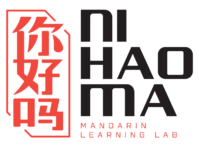Knowing some basic medical terms in Chinese can be incredibly helpful. Whether you need to describe your symptoms, ask for medical assistance, or read a prescription, having the right vocabulary makes communication much easier. This list of over 100 essential medical terms in Chinese is not only a valuable resource for students but also a practical guide for anyone who may encounter Chinese healthcare settings. Let’s explore the most common medical vocabulary together with Ni Hao Ma!
Medical Vocabulary in Chinese
To help you study systematically, Ni Hao Ma has compiled and organized the most common medical terms in Chinese into smaller groups. Each term comes with its Chinese characters, pinyin, and clear meaning in English.
Chinese Medical Terms for Types of Hospitals
There are many different types of hospitals, each with its own function, responsibilities, and specialties to meet the diverse healthcare needs of the public. For example, general hospitals can treat a wide variety of diseases (like Bach Mai Hospital or Cho Ray Hospital), while specialized hospitals focus on a specific field (such as children’s hospitals or oncology hospitals). Hospitals can also be categorized as public or private based on management and funding.
| Chinese | Pinyin | Meaning |
|---|---|---|
| 医院 | yīyuàn | Hospital |
| 综合医院 | zōnghé yīyuàn | General hospital |
| 专科医院 | zhuānkē yīyuàn | Specialized hospital |
| 儿童医院 | értóng yīyuàn | Children’s hospital |
| 妇产医院 | fùchǎn yīyuàn | Maternity hospital |
| 精神病医院 | jīngshénbìng yīyuàn | Psychiatric hospital |
| 口腔医院 | kǒuqiāng yīyuàn | Dental hospital |
| 眼科医院 | yǎnkē yīyuàn | Eye hospital |
| 中医医院 | zhōngyī yīyuàn | Traditional Chinese medicine hospital |
| 传染病医院 | chuánrǎnbìng yīyuàn | Infectious disease hospital |
| 急救中心 | jíjiù zhōngxīn | Emergency center |
| 康复医院 | kāngfù yīyuàn | Rehabilitation hospital |
| 军队医院 | jūnduì yīyuàn | Military hospital |
| 私立医院 | sīlì yīyuàn | Private hospital |
| 公立医院 | gōnglì yīyuàn | Public hospital |
| 诊所 | zhěnsuǒ | Clinic |
| 骨科医院 | gǔkē yīyuàn | Orthopedic hospital |
Chinese Medical Terms for Hospital Departments
According to Vietnam’s Ministry of Health regulations, a first-class general hospital typically has the following departments. These medical terms in Chinese will help you navigate hospital facilities and services more confidently.
| Chinese | Pinyin | Meaning |
|---|---|---|
| 诊室 | zhěnshì | Outpatient clinic |
| 急诊科 | jízhěn kē | Emergency department |
| 内科 | nèikē | Internal medicine |
| 心内科 | xīn nèikē | Cardiology |
| 消化内科 | xiāohuà nèikē | Gastroenterology |
| 风湿免疫科 | fēngshī miǎnyì kē | Rheumatology |
| 肾脏内科 | shènzàng nèikē | Nephrology |
| 内分泌科 | nèifēnmì kē | Endocrinology |
| 过敏反应科 | guòmǐn fǎnyìng kē | Allergy |
| 血液科 | xuèyè kē | Hematology |
| 感染科 | gǎnrǎn kē | Infectious diseases |
| 结核科 | jiéhé kē | Tuberculosis |
| 皮肤科 | pífū kē | Dermatology |
| 神经内科 | shénjīng nèikē | Neurology |
| 精神科 | jīngshén kē | Psychiatry |
| 中医科 | zhōngyī kē | Traditional Chinese medicine |
| 老年病科 | lǎonián bìng kē | Geriatrics |
| 儿科 | érkē | Pediatrics |
| 外科 | wàikē | Surgery |
| 神经外科 | shénjīng wàikē | Neurosurgery |
| 胸外科 | xiōng wàikē | Thoracic surgery |
| 普通外科 | pǔtōng wàikē | General surgery |
| 泌尿外科 | mìniào wàikē | Urology |
| 骨科 | gǔkē | Orthopedics |
| 烧伤科 | shāoshāng kē | Burn unit |
| 麻醉科 | mázuì kē | Anesthesiology |
| 妇产科 | fùchǎn kē | Obstetrics and gynecology |
| 耳鼻喉科 | ěr bí hóu kē | ENT (Ear, Nose & Throat) |
| 口腔科 | kǒuqiāng kē | Dentistry |
| 眼科 | yǎnkē | Ophthalmology |
| 物理治疗与康复科 | wùlǐ zhìliáo yǔ kāngfù kē | Physical therapy & rehabilitation |
| 核医学科 | hé yīxué kē | Nuclear medicine |
| 输血科 | shūxuè kē | Transfusion medicine |
| 血液透析室 | xuèyè tòuxī shì | Hemodialysis unit |
| 生化科 | shēnghuà kē | Biochemistry |
| 微生物科 | wēishēngwù kē | Microbiology |
| 影像诊断科 | yǐngxiàng zhěnduàn kē | Radiology |
| 功能检查科 | gōngnéng jiǎnchá kē | Functional testing |
| 内镜室 | nèijìng shì | Endoscopy |
| 病理科 | bìnglǐ kē | Pathology |
| 消毒供应中心 | xiāodú gōngyìng zhōngxīn | Sterilization center |
| 药剂科 | yàojì kē | Pharmacy |
| 营养科 | yíngyǎng kē | Nutrition |

Chinese Medical Vocabulary for Hospital Roles
Understanding hospital roles is crucial when learning medical terms in Chinese, especially for those who plan to study or work in healthcare environments in China. These terms are not only useful for medical students and professionals but also for anyone who may need medical assistance abroad.
| Chinese | Pinyin | Meaning |
|---|---|---|
| 院长 | yuànzhǎng | Hospital Director |
| 副院长 | fù yuànzhǎng | Deputy Director |
| 科主任 | kē zhǔrèn | Department Head |
| 副主任 | fù zhǔrèn | Deputy Head of Department |
| 医生 | yīshēng | Doctor |
| 护士 | hùshì | Nurse |
| 护理长 | hùlǐ zhǎng | Head Nurse |
| 药剂师 | yàojìshī | Pharmacist |
| 住院医生 | zhùyuàn yīshēng | Resident Doctor |
| 外科医生 | wàikē yīshēng | Surgeon |
| 儿科医生 | érkē yīshēng | Pediatrician |
| 助产士 | zhùchǎnshì | Midwife |
| 化验师 | huàyànshī | Laboratory Technician |
| 影像技师 | yǐngxiàng jìshī | Radiology Technician |
| 行政人员 | xíngzhèng rényuán | Administrative Staff |
| 救护车司机 | jiùhùchē sījī | Ambulance Driver |
Medical Terms in Chinese for Common Symptoms
Learning Chinese medical vocabulary for symptoms is extremely helpful in real-life situations. For medical students and professionals, it supports research, study, and communication with international colleagues. For travelers or patients in China, knowing these terms can help describe health conditions clearly and ensure accurate diagnosis from doctors.
| Chinese | Pinyin | Meaning |
|---|---|---|
| 头疼 | tóuténg | Headache |
| 发烧 | fāshāo | Fever |
| 咳嗽 | késou | Cough |
| 流鼻涕 | liú bítì | Runny nose |
| 喉咙痛 | hóulóng tòng | Sore throat |
| 胸闷 | xiōngmèn | Chest tightness |
| 气喘 | qìchuǎn | Shortness of breath, Wheezing |
| 心悸 | xīnjì | Palpitations, Rapid heartbeat |
| 恶心 | ěxīn | Nausea |
| 呕吐 | ǒutù | Vomiting |
| 腹泻 | fùxiè | Diarrhea |
| 便秘 | biànmì | Constipation |
| 腹痛 | fùtòng | Stomachache |
| 背痛 | bèitòng | Back pain |
| 关节痛 | guānjié tòng | Joint pain |
| 肌肉酸痛 | jīròu suāntòng | Muscle soreness |
| 头晕 | tóuyūn | Dizziness |
| 失眠 | shīmián | Insomnia |
| 疲劳 | píláo | Fatigue |
| 出汗 | chūhàn | Sweating |
| 盗汗 | dàohàn | Night sweats |
| 耳鸣 | ěrmíng | Tinnitus (ringing in ears) |
| 视力模糊 | shìlì móhu | Blurred vision |
| 流泪 | liúlèi | Watery eyes |
| 皮疹 | pízhěn | Rash |
| 瘙痒 | sàoyǎng | Itching |
| 出血 | chūxuè | Bleeding |
| 麻木 | mámù | Numbness |
| 抽筋 | chōujīn | Cramp |
| 虚弱 | xūruò | Weakness |

| Chinese | Pinyin | Meaning |
|---|---|---|
| 感冒 | gǎnmào | Cold |
| 发冷 | fālěng | Chills |
| 食欲不振 | shíyù bùzhèn | Loss of appetite |
| 消化不良 | xiāohuà bùliáng | Indigestion |
| 胃胀 | wèizhàng | Bloating |
| 胃酸 | wèisuān | Acid reflux |
| 打嗝 | dǎgé | Hiccups |
| 胃痛 | wèitòng | Stomach pain |
| 小便频繁 | xiǎobiàn pínfán | Frequent urination |
| 尿急 | niào jí | Urinary urgency |
| 尿痛 | niào tòng | Painful urination |
| 血尿 | xuèniào | Blood in urine |
| 月经不调 | yuèjīng bùtiáo | Irregular menstruation |
| 痛经 | tòngjīng | Menstrual cramps |
| 不孕 | bùyùn | Infertility |
| 幻觉 | huànjué | Hallucination |
| 抑郁 | yìyù | Depression |
| 焦虑 | jiāolǜ | Anxiety |
| 易怒 | yìnù | Irritability |
| 记忆力减退 | jìyìlì jiǎntuì | Memory loss |
| 手抖 | shǒu dǒu | Hand tremor |
| 走路不稳 | zǒulù bùwěn | Unsteady walking |
| 皮肤苍白 | pífū cāngbái | Pale skin |
| 黄疸 | huángdǎn | Jaundice |
| 脱发 | tuōfà | Hair loss |
| 水肿 | shuǐzhǒng | Edema (swelling) |
| 淋巴结肿大 | línbā jié zhǒngdà | Swollen lymph nodes |
| 伤口化脓 | shāngkǒu huànóng | Infected wound |
| 呼吸困难 | hūxī kùnnán | Breathing difficulty |
| 昏迷 | hūnmí | Coma |
Medical Terms in Chinese: Common Diseases
If you are planning to travel, study, or work in a Chinese-speaking country, learning medical terms in Chinese for diseases is essential. This vocabulary will not only help you communicate effectively in hospitals and clinics but also prove extremely useful in emergencies. Here’s a list of common diseases in Chinese with pinyin and meanings:
| Chinese | Pinyin | Meaning |
|---|---|---|
| 感冒 | gǎnmào | Common cold |
| 流行性感冒 | liúxíng gǎnmào | Seasonal flu |
| 登革热 | dēngérè | Dengue fever |
| 疟疾 | nüèjí | Malaria |
| 肺炎 | fèiyán | Pneumonia |
| 咽喉炎 | yānhóuyán | Pharyngitis (sore throat infection) |
| 鼻窦炎 | bídòu yán | Sinusitis |
| 支气管炎 | zhīqìguǎn yán | Bronchitis |
| 哮喘 | xiāochuǎn | Asthma |
| 胃炎 | wèiyán | Gastritis |
| 肠炎 | chángyán | Enteritis |
| 食物中毒 | shíwù zhòngdú | Food poisoning |
| 阑尾炎 | lánwěiyán | Appendicitis |
| 高血压 | gāo xuèyā | Hypertension (high blood pressure) |
| 心脏病 | xīnzàngbìng | Heart disease |
| 糖尿病 | tángniàobìng | Diabetes |
| 肝炎 | gānyán | Hepatitis |
| 肝硬变 | gānyìngbiàn | Cirrhosis |
| 肾结石 | shèn jiéshí | Kidney stones |
| 湿疹 | shīzhěn | Eczema |
| 麻疹 | mázhěn | Measles |
| 霍乱 | huòluàn | Cholera |
| 梅毒 | méi dú | Syphilis |
| 癌症 | áizhèng | Cancer |
| 肿瘤 | zhǒngliú | Tumor |
| 甲亢 | jiǎkàng | Hyperthyroidism |
| 贫血 | pínxuè | Anemia |
| 骨折 | gǔzhé | Bone fracture |
| 扭伤 | niǔshāng | Sprain |
| 过敏 | guòmǐn | Allergy |
| 精神病 | jīngshénbìng | Mental illness |
| 焦虑症 | jiāolǜ zhèng | Anxiety disorder |
| 抑郁症 | yìyù zhèng | Depression |
| 自闭症 | zìbìzhèng | Autism |
| 脑膜炎 | nǎomóyán | Meningitis |
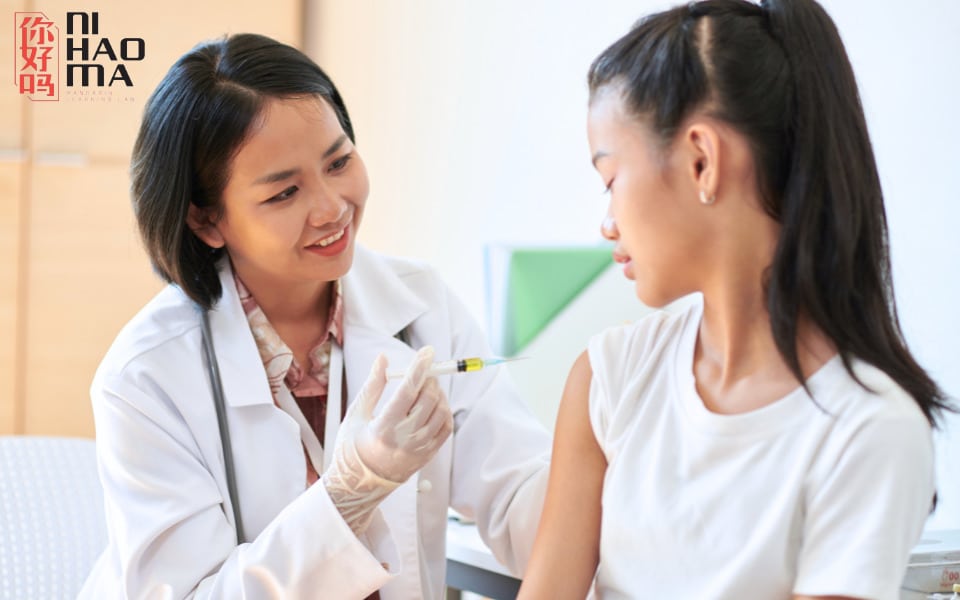
| Chinese | Pinyin | Meaning |
|---|---|---|
| 心脏病 | xīnzàngbìng | Heart disease |
| 心肌梗塞 | xīnjī gěngsè | Myocardial infarction (heart attack) |
| 冠心病 | guānxīnbìng | Coronary heart disease |
| 白化病 | báihuàbìng | Albinism |
| 高血脂 | gāo xuèzhī | Hyperlipidemia (high cholesterol) |
| 脑卒中 | nǎozúzhòng | Stroke |
| 帕金森病 | pàjīnsēn bìng | Parkinson’s disease |
| 阿尔茨海默病 | āěrcíhǎimò bìng | Alzheimer’s disease |
| 腰椎间盘突出 | yāozhuī jiānpán tūchū | Herniated disc |
| 关节炎 | guānjiéyán | Arthritis |
| 类风湿 | lèifēngshī | Rheumatism |
| 痛风 | tòngfēng | Gout |
| 白内障 | báinèizhàng | Cataract |
| 青光眼 | qīngguāngyǎn | Glaucoma |
| 近视 | jìnshì | Nearsightedness (myopia) |
| 远视 | yuǎnshì | Farsightedness (hyperopia) |
| 结膜炎 | jiémóyán | Conjunctivitis |
| 肾炎 | shènyán | Nephritis |
| 尿毒症 | niàodúzhèng | Uremia (chronic kidney failure) |
| 前列腺炎 | qiánlièxiànyán | Prostatitis |
| 子宫肌瘤 | zǐgōng jīliú | Uterine fibroids |
| 脂肪肝 | zhīfánggān | Fatty liver disease |
| 乳腺癌 | rǔxiàn ái | Breast cancer |
| 甲状腺疾病 | jiǎzhuàngxiàn jíbìng | Thyroid disease |
| 骨质疏松 | gǔzhì shūsōng | Osteoporosis |
| 艾滋病 | àizībìng | AIDS |
| 肺结核 | fèi jiéhé | Tuberculosis |
| 腮腺炎 | sāixiànyán | Mumps |
| 水痘 | shuǐdòu | Chickenpox |
| 手足口病 | shǒuzúkǒu bìng | Hand, foot, and mouth disease |
| 牛皮癣 | niúpíxuǎn | Psoriasis |
| 不孕不育 | bùyùn bùyù | Infertility |
| 结肠炎 | jiéchángyán | Colitis |
Medical Terms in Chinese: Medical Equipment
| Chinese | Pinyin | Meaning |
|---|---|---|
| 听诊器 | tīngzhěnqì | Stethoscope |
| 体温计 | tǐwēnjì | Thermometer |
| 血压计 | xuèyā jì | Blood pressure monitor |
| 注射器 | zhùshèqì | Syringe |
| 注射针头 | zhùshè zhēntóu | Injection needle |
| 手术刀 | shǒushù dāo | Scalpel |
| 手术剪刀 | shǒushù jiǎndāo | Surgical scissors |
| 绷带 | bēngdài | Bandage |
| 胶布 | jiāobù | Medical tape |
| 医用口罩 | yīyòng kǒuzhào | Medical mask |
| 医用手套 | yīyòng shǒutào | Medical gloves |
| 消毒脱脂棉花 | xiāodú tuōzhīmián huā | Sterile cotton |
| 担架 | dānjià | Stretcher |
| 轮椅 | lúnyǐ | Wheelchair |
| 病床 | bìngchuáng | Hospital bed |
| 诊断床 | zhěnduàn chuáng | Examination bed |
| 医药箱 | yīyào xiāng | First aid kit / Medicine box |
| 急救箱 | jíjiù xiāng | Emergency kit |
| 输液泵 | shūyè bèng | Infusion pump |
| 超声波机 | chāoshēngbō jī | Ultrasound machine |
| X光机 | X guāng jī | X-ray machine |
| CT扫描仪 | CT sǎomiáoyí | CT scanner |
| 显微镜 | xiǎnwéijìng | Microscope |
| 呼吸机 | hūxī jī | Ventilator |
| 氧气瓶 | yǎngqì píng | Oxygen tank |
| 压舌板 | yā shé bǎn | Tongue depressor |
| 叩诊槌 | kòuzhěn chuí | Reflex hammer |
| 缝线 | fèngxiàn | Surgical suture |
| 监护仪 | jiānhù yí | Patient monitor |
| 视力表 | shìlì biǎo | Eye chart |
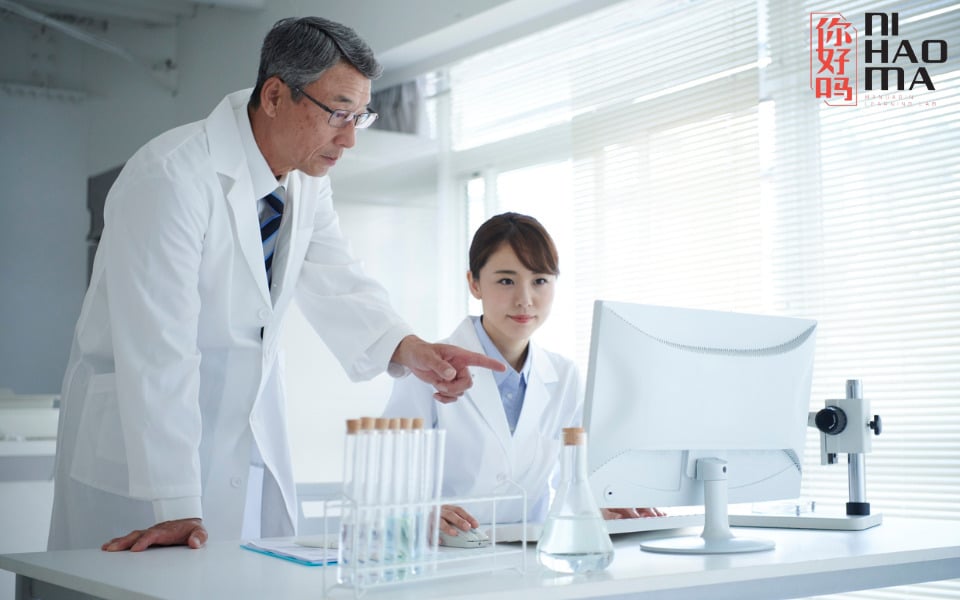
| Chinese | Pinyin | Meaning |
|---|---|---|
| 胃镜 | wèijìng | Gastroscope |
| 结肠镜 | jiéchángjìng | Colonoscope |
| 核磁共振成像仪 | hémó gòngzhèn chéngxiàng yí | MRI scanner |
| CT扫描机 | CT sǎomiáo jī | CT scanner |
| 心电图机 | xīndiàntú jī | Electrocardiograph (ECG machine) |
| 除颤器 | chúchànqì | Defibrillator |
| 手术钳 | shǒushù qián | Surgical forceps |
| 镊子 | nièzi | Tweezers |
| 止血钳 | zhǐxuè qián | Hemostatic forceps |
| 敷料 | fūliào | Medical dressing |
| 纱布 | shābù | Gauze |
| 纱布垫 | shābù diàn | Gauze pad |
| 药棉 | yàomián | Medical cotton |
| 棉签 | miánqiān | Cotton swab |
| 导管 | dǎoguǎn | Catheter |
| 输液架 | shūyè jià | IV stand |
| 助听器 | zhùtīngqì | Hearing aid |
| 拐杖 | guǎizhàng | Crutches |
| 医用床单 | yīyòng chuángdān | Medical bed sheet |
| 手术服 | shǒushù fú | Surgical gown |
| 白大褂 | báidàguà | White coat (doctor’s coat) |
| 医用秤 | yīyòng chèng | Medical scale |
| 氧气面罩 | yǎngqì miànzhào | Oxygen mask |
| 肾脏透析机 | shènzàng tòuxījī | Dialysis machine |
| 离心机 | líxīnjī | Centrifuge |
| 试管 | shìguǎn | Test tube |
Common Medical Activities in Chinese
| Chinese | Pinyin | Meaning |
|---|---|---|
| 看病 | kànbìng | To see a doctor |
| 挂号 | guàhào | To register (for consultation) |
| 候诊 | hòuzhěn | To wait for consultation |
| 问诊 | wènzhěn | Medical inquiry / Taking patient history |
| 量体温 | liáng tǐwēn | To measure body temperature |
| 诊断 | zhěnduàn | Diagnosis |
| 量血压 | liáng xuèyā | To measure blood pressure |
| 听诊 | tīngzhěn | Auscultation (listening with stethoscope) |
| 抽血 | chōuxuè | To draw blood |
| 化验 | huàyàn | Laboratory test |
| 检查 | jiǎnchá | Examination / Check-up |
| 拍X光 | pāi X guāng | To take an X-ray |
| 做CT | zuò CT | To do a CT scan |
| 做B超 | zuò B chāo | To do an ultrasound |
| 开处方 | kāi chùfāng | To prescribe medicine |
| 买药 | mǎi yào | To buy medicine |
| 打针 | dǎzhēn | To get an injection |
| 吃药 | chī yào | To take medicine (orally) |
| 输液 | shūyè | To receive IV infusion |
| 手术 | shǒushù | Surgery |
| 麻醉 | mázuì | Anesthesia |
| 缝合 | fénghé | To suture (stitch a wound) |
| 换药 | huànyào | To change the dressing |
| 消毒 | xiāodú | Disinfection |
| 输血 | shūxuè | Blood transfusion |
| 复查 | fùchá | Follow-up check |
| 康复 | kāngfù | Rehabilitation / Recovery |
| 住院 | zhùyuàn | Hospitalization |
| 出院 | chūyuàn | Discharge from hospital |
You may also be interested in: A Complete List of Chinese Vocabulary for Human Body Parts
Sample Dialogues with Medical Terms In Chinese
In the medical environment, accurate communication between doctors and patients is extremely important. The following sample dialogues will help you get familiar with medical terms in Chinese, including situations of medical examination, getting medicine, and regular health check-ups.
Dialogue 1: Initial Consultation
A: 你哪里不舒服?
(Nǐ nǎlǐ bù shūfú?)
Where do you feel unwell?
B: 我这几天一直咳嗽,还有点发烧。
(Wǒ zhè jǐ tiān yīzhí késòu, hái yǒu diǎn fāshāo.)
I’ve been coughing these past few days, and I also have a slight fever.
A: 你有呼吸困难吗?
(Nǐ yǒu hūxī kùnnán ma?)
Do you have difficulty breathing?
B: 有一点,晚上更严重。
(Yǒu yīdiǎn, wǎnshàng gèng yánzhòng.)
A little, and it gets worse at night.
A: 你有没有过敏史?对药物或者食物过敏吗?
(Nǐ yǒu méiyǒu guòmǐn shǐ? Duì yàowù huòzhě shíwù guòmǐn ma?)
Do you have a history of allergies? Are you allergic to any medicines or foods?
B: 没有,我以前身体比较健康。
(Méiyǒu, wǒ yǐqián shēntǐ bǐjiào jiànkāng.)
No, I used to be quite healthy.
A: 好的,我建议你做个胸部X光和血液检查,以便确诊。
(Hǎo de, wǒ jiànyì nǐ zuò gè xiōngbù X guāng hé xuèyè jiǎnchá, yǐbiàn quèzhěn.)
Alright, I suggest you do a chest X-ray and a blood test for an accurate diagnosis.
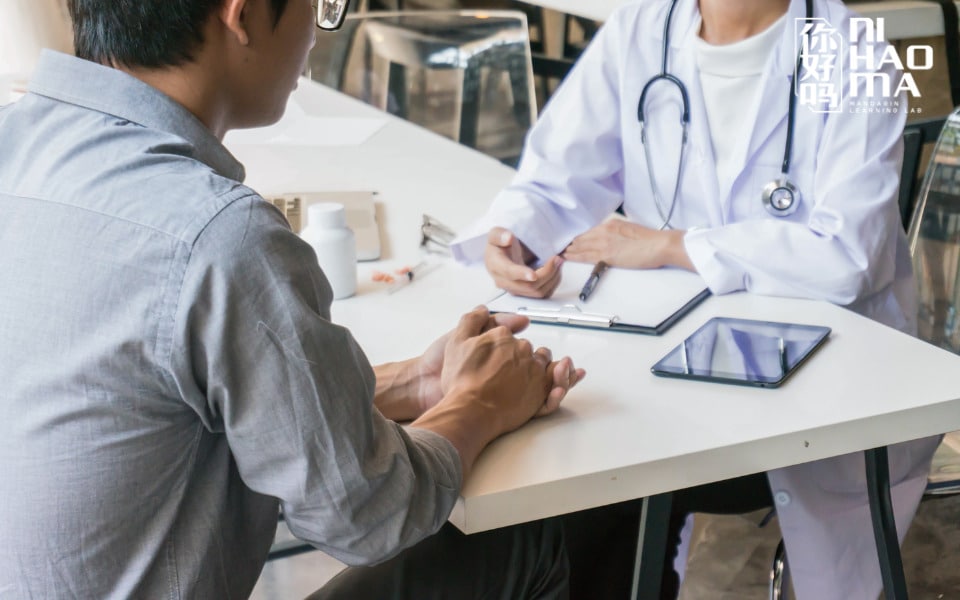
Dialogue 2: Collecting Medicine at the Pharmacy
A: 您的处方在这里,请您核对一下名字和药品。
(Nín de chǔfāng zài zhèlǐ, qǐng nín héduì yīxià míngzì hé yàopǐn.)
Here’s your prescription. Please check your name and the medicines.
B: 好的,这些药怎么吃?
(Hǎo de, zhèxiē yào zěnme chī?)
Okay, how should I take these medicines?
A: 这个每天三次,每次一片;那个饭后吃。
(Zhège měitiān sān cì, měi cì yī piàn; nàgè fànhòu chī.)
Take this one three times a day, one tablet each time; the other should be taken after meals.
B: 如果我忘记吃药怎么办?
(Rúguǒ wǒ wàngjì chī yào zěnme bàn?)
What should I do if I forget to take my medicine?
A: 想起来的时候尽快补服,但不要一次吃两倍剂量。
(Xiǎng qǐlái de shíhòu jǐnkuài bǔ fú, dàn bùyào yīcì chī liǎng bèi jìliàng.)
Take it as soon as you remember, but don’t double the dose.
B: 明白了,有什么副作用吗?
(Míngbái le, yǒu shénme fùzuòyòng ma?)
Got it. Are there any side effects?
A: 可能会有点嗜睡,如果严重不适要立刻停药并联系医生。
(Kěnéng huì yǒudiǎn shìshuì, rúguǒ yánzhòng búshì yào lìkè tíngyào bìng liánxì yīshēng.)
It may cause slight drowsiness. If you feel severe discomfort, stop taking it immediately and contact your doctor.
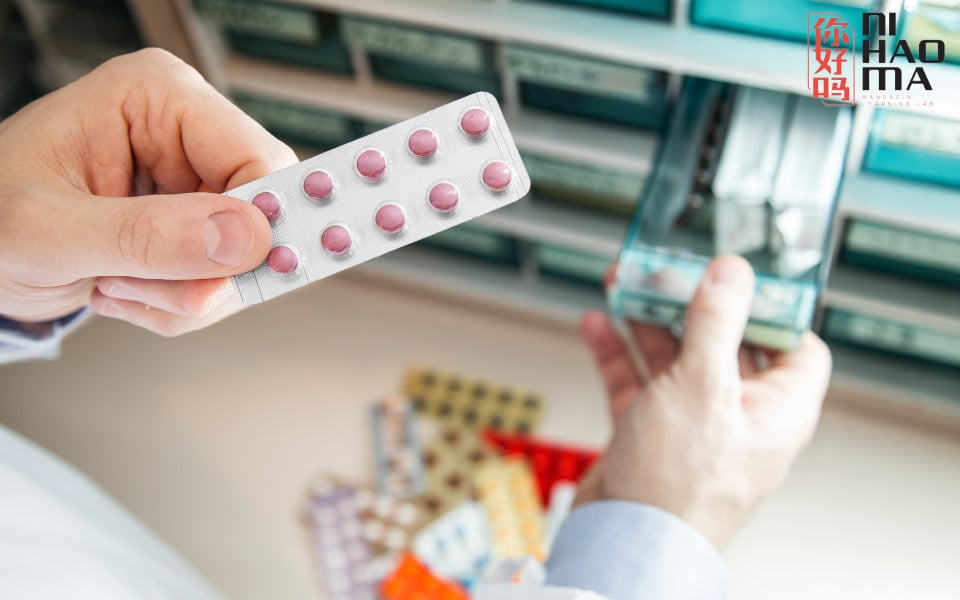
Dialogue 3: Regular Health Check-Up
A: 你的血压有点高,平时饮食注意吗?
(Nǐ de xuèyā yǒu diǎn gāo, píngshí yǐnshí zhùyì ma?)
Your blood pressure is a bit high. Do you usually watch your diet?
B: 我比较喜欢吃咸的。
(Wǒ bǐjiào xǐhuān chī xián de.)
I like eating salty foods.
A: 要减少盐的摄入,多吃蔬菜水果,还要控制体重。
(Yào jiǎnshǎo yán de shèrù, duō chī shūcài shuǐguǒ, hái yào kòngzhì tǐzhòng.)
You should reduce salt intake, eat more fruits and vegetables, and control your weight.
B: 我平时运动不多,是不是也有影响?
(Wǒ píngshí yùndòng bù duō, shì bù shì yě yǒu yǐngxiǎng?)
I don’t exercise much. Does that also affect it?
A: 当然,建议你每周至少运动三次,每次三十分钟。
(Dāngrán, jiànyì nǐ měi zhōu zhìshǎo yùndòng sān cì, měi cì sānshí fēnzhōng.)
Of course. I recommend you exercise at least three times a week, 30 minutes each time.
B: 好的,我会注意生活习惯。
(Hǎo de, wǒ huì zhùyì shēnghuó xíguàn.)
Alright, I’ll pay attention to my lifestyle habits.
Conclusion
Above, we have summarized over 100 essential medical terms in Chinese, carefully compiled by Ni Hao Ma. We hope these words and sample dialogues will be useful when you need to describe your health condition or communicate about medical-related topics.
